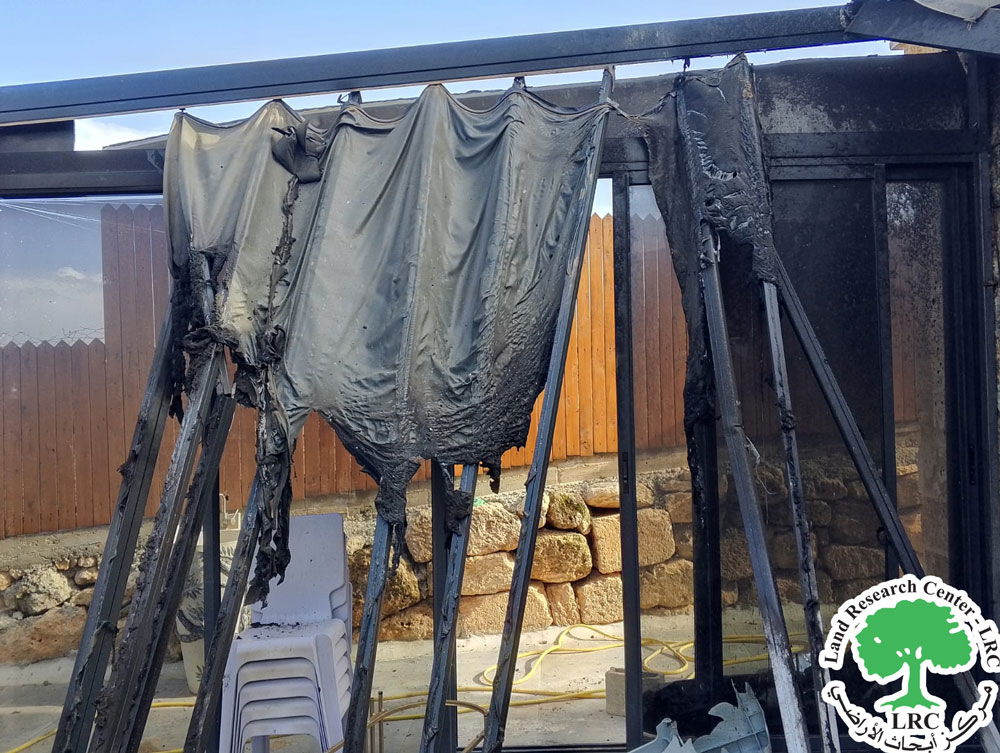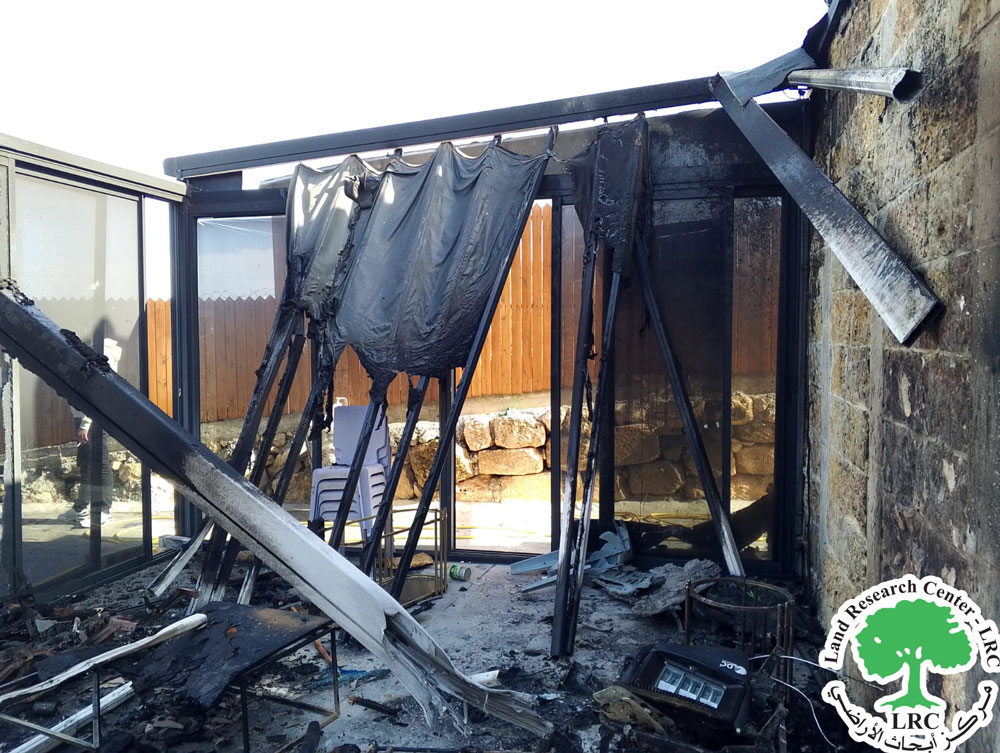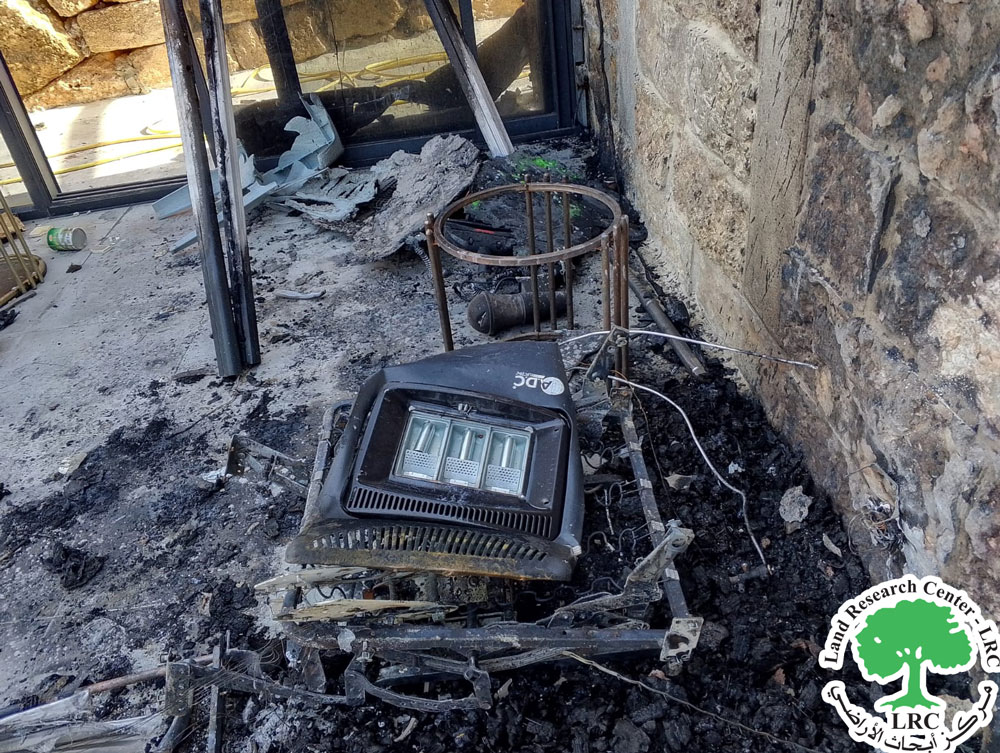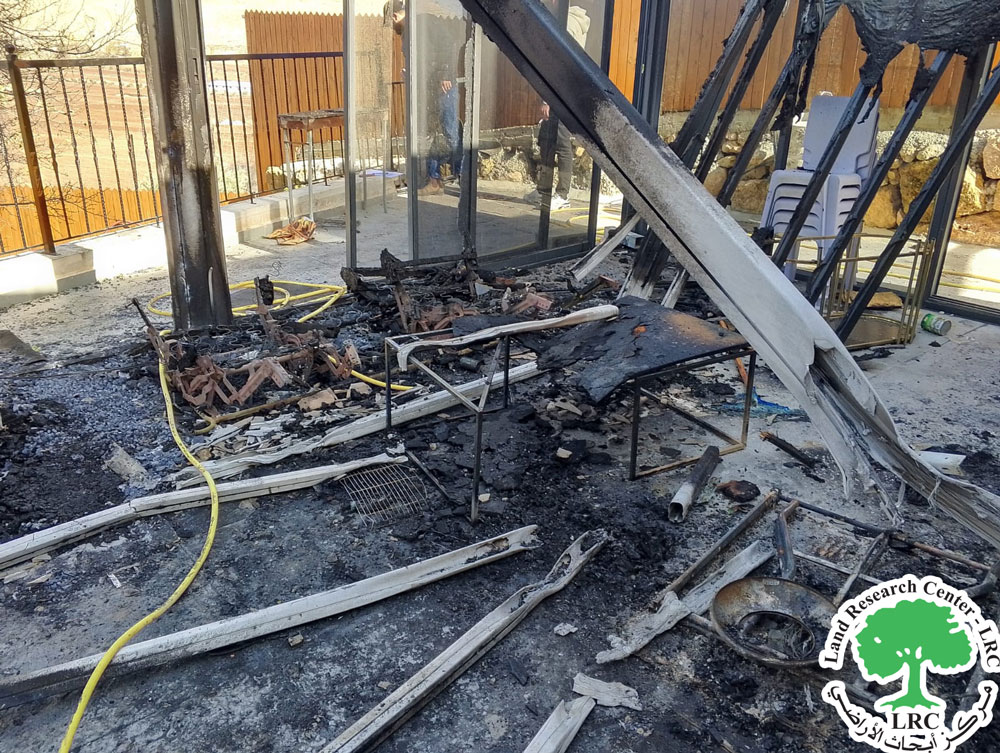2025-01-04
Colonists Set Fire to an Agricultural Building in Abu Falah Village/ Northeast of Ramallah
Violation: setting fire to an agricultural building and destroying its contents.
Location: Khirbet Abu Falah / North of Ramallah.
Date of Violation: 04/01/2025.
Perpetrators: Colonists.
Affected Party: Farmer Nael Abdullah Saeed Zuhour.
Description:
Saturday afternoon, January 4, 2025, Khirbet Abu Falah village, located north of Ramallah, witnessed a new assault by a group of colonists coming from a grazing outpost established on the eastern outskirts of the village, approximately 2 km away from the village's homes.
The group of colonists raided a private park belongs toby farmer Nael Abdullah Saeed Zuhour, who supports a family of ten members, including three females, with no children among them. It is noteworthy that the affected farmer holds American citizenship and resides in the United States.
Regarding the details of the incident, his brother, Fouzan Abdullah Zuhour, stated:
"My brother, Nael Abdullah Saeed Zuhour (68 years old), owns a plot of land with a total area of two dunums and 200 square meters in the Jabal Si’a area, located east of Abu Falah village. This area is classified as Area 'B' under the Oslo Accords. My brother holds a Palestinian ID card and American citizenship."
He added:
"In 2003, my brother Nael established a farm on that land, It consists of an agricultural building made of stone and reinforced concrete, comprising two floors with a total area of 80 m². He also enclosed the land with concrete walls and fencing and organized the sloped terrain with stone terraces."
He said:
"At the beginning of 2024, my brother added reinforced glass (safety glass) to the room located on the second floor of the building. The purpose of the structure is to provide a place for the family when they visit the land for agriculture, as the land and building overlook a vast agricultural plain called 'Marj Si’a,' where the villagers cultivate olive trees and seasonal crops such as grains and vegetables."
It is worth noting that the entire area was previously far from settlements and bypass roads and had not witnessed any settler attacks until October 7, 2023. Following that, settlers began launching attacks in the area, including breaking olive trees, damaging crops, burning vehicles, and assaulting residents. Additionally, the settlers established a pastoral outpost to the east of the area, approximately 1.5 km away.
He added:
"On Saturday, January 4, 2025, between 4:00 and 5:00 PM, I was at my home in the center of Abu Falah village when we received news through the village’s social media channels calling on the residents to rise up and defend their lands against the settlers, who were attacking the area, including burning my brother Nael’s farm.
We quickly moved toward the farm area, only to find that Israeli occupation soldiers were preventing the villagers from reaching Jabal and Marj Si’a. The soldiers had set up several checkpoints in the area."
"My sons, relatives, and I managed to reach the agricultural room on foot via side paths and mountain trails. When we arrived, we found the room eaten by in flames, while a fire truck from the neighboring town of Turmus’ayya was working to stop the fire. The Israeli occupation soldiers allowed the fire truck to reach the site and did not obstruct its work. I noticed that the flames were consuming the 'safety glass' room, and the settlers were not present when we arrived—they had fled after setting the room on fire. Despite the blaze, we made sure to turn off the generators located in a room on the first floor of the building to prevent the fire from spreading to them, It took approximately 45 minutes for the firefighters to stop the fire.
After the fire was extinguished, we inspected the 'safety glass' room and found that it had been completely destroyed by the flames, including the glass and the room’s ceiling. All the furniture inside was burned, such as chairs, the central table, benches, the television, and the gas heater. The fire caused a large gas cylinder connected to the heater to explode, in addition to burning an electric heater.
We also noticed that the settlers had smashed the solar panels installed on the stone room’s roof, which were connected to the 'safety glass' room. They also destroyed six lighting fixtures mounted on the room. I can say that the losses are immense due to the high cost of constructing the room."
Agricultural Rooms is a target for Israeli violations
The Israeli Occupation forces target agricultural rooms built by Palestinian farmers on their land—the rooms are used to rest after ciompletin any of the farm’s tiring work like plowing, irrigation, and pesticide spraying—serves a clear purpose. The occupation and its settlers aim to Palestinian farmers from accessing their land, instill fear for their safety, and ultimately prevent them from reaching their land securely.
According to Land Research Center, since the start of the war on Gaza up until November 2024, Israeli authorities have demolished 302 agricultural structures, including 54 agricultural rooms. Additionally, settlers have burned, vandalized, or destroyed 446 agricultural properties, including 106 agricultural rooms.
This systematic targeting reveals a coordinated effort between the Israeli military and settlers to attack agricultural infrastructure and lands, aiming to render these areas vacant. By instilling fear among Palestinians, the occupation seeks to turn these lands into reserves for colonial expansion.
Burning Agricultural Structures and Its Environmental Impact
Many Palestinian farmers construct agricultural rooms on their lands to rest, storing farming tools, fertilizers, chemical pesticides, irrigation pipes, and other equipment. Some of these rooms also contain furniture made of materials like plastic or foam.
These rooms are widespread across Palestinian lands and have recently become a frequent target of Israeli occupation forces and settlers. In addition to demolition and threats, settlers often resort to burning agricultural rooms, as seen in the case of the Zuhour family, whose agricultural room was set ablaze by settlers.
The burning of these rooms causes significant environmental harm, especially since they often contain plastic materials and chemical pesticides. This leads to the release of various pollutants into the air, causing discomfort and harm to humans, animals, and crops.
Plastic materials, rich in carbon, contribute to greenhouse gas emissions when burned. The fires also release airborne ash particles, further polluting the atmosphere. If chemical pesticides are present in the rooms, their evaporation during the fire releases toxic substances into the air, posing serious health risks to people who inhale these pesticide fumes.
Despite the fact that the Israeli Ministry of Environmental Protection is the responsible authority for environmental protection and pollution control, as stated on its official website—where it mentions that "air pollution does not stay in one place, nor does it know borders; it spreads according to climate conditions, winds, temperature, and humidity"—the primary contributors to air pollution are the settlers in the settlements and outposts across the West Bank. The burning of agricultural structures, trees, crops, other buildings, and even Palestinian homes and vehicles is a widespread practice among settlers.
According to the Israeli Criminal Procedures Order of 2022, "burning waste in an illegal location is subject to a fine of 2,000 shekels for an individual and 12,000 shekels for a company." The order further acknowledges that such practices can lead to chronic illnesses and an increased risk of cancer due to the inhalation of toxic substances.
The burning of such agricultural rooms is no less harmful than burning waste; in fact, it is even more detrimental because it occurs on agricultural land that is privately owned by Palestinians. Therefore, the violation should be considered more severe due to the illegal entry onto someone else's property and the environmental harm caused.
Undoubtedly, the actions of the Israeli side violate not only international laws but also Israeli laws themselves. Referring to the details of this case, the Israeli Penal Code of 1977 and its amendments stipulate that trespassing on someone else's property with the intent to commit a crime is punishable by law. Article 447 of the Penal Code states:
"Anyone who does any of the following with the intent to intimidate, insult, or harass the property owner, or to commit a crime, shall be punished with imprisonment for two years:
(1) enters or crosses the property;
(2) enters the property unlawfully."
(b) A crime is committed under this section if the offender carries a firearm or a sharp weapon, and the punishment is imprisonment for four years.
Reading the text of this article, it is clear that the Israeli Penal Code criminalizes the mere act of entering someone else's property without authorization, with the intent to insult, harass, or intimidate, and punishes it with a two-year prison sentence. The punishment is doubled if the offender enters the property and commits a crime, such as using a weapon or sharp tool, or even vandalizing agricultural land by cutting, burning, or destroying it. This is explicitly prohibited in the text of the aforementioned Penal Code.
مشروع: حماية الحقوق البيئية الفلسطينية في مناطق "ج" SPERAC IV - FCDO
Disclaimer: The views and opinions expressed in this report are those of Land Research Center and do not necessarily reflect the views or positions of the project donor; the Norwegian Refugee Council.
إخلاء المسؤولية: الآراء ووجهات النظر الواردة في هذا التقرير هي آراء ووجهات نظر مركز أبحاث الأراضي ولا تعكس بالضرورة وجهات نظر أو مواقف الجهة المانحة للمشروع؛ المجلس النرويجي. للاجئين




